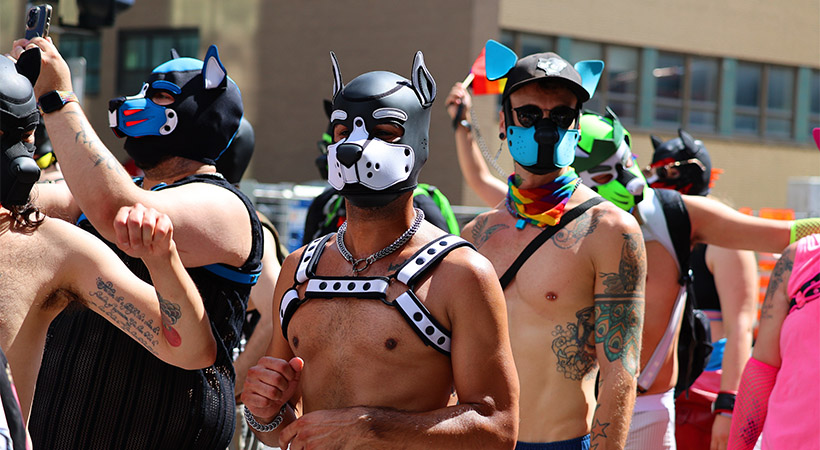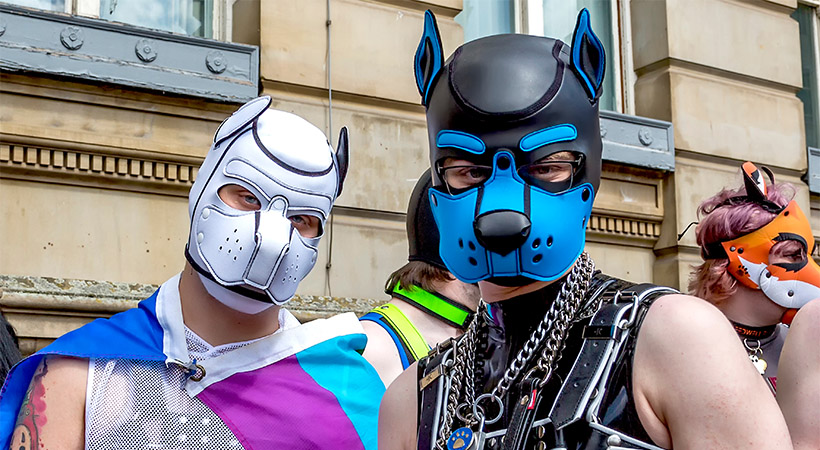Got an itch that needs a good belly rub?
Puppy play has become increasingly popular, especially among gay and bi+ guys. It’s grown from a niche kink group to a thriving community with representation at some the world’s biggest leather and fetish festivals, including the Folsom Street Fair, Folsom Europe, CLAW and Easter in Berlin. Australia is wagging its tail with the rest of the world – Melbourne even hosted the first Australian Pup and Handler Competition in 2017.
But if you’re not a member of the leather or kink community, you’re very possibly wondering what it’s all about. What’s the appeal of acting like a dog? What are the leashes about? And what makes a good pup?
As always, you have questions, and we have answers. We spoke with a local pup and handler to get the inside scoop on this expansive community.
What is puppy play?
Puppy play is a type of role play that emulates canine behaviour, sometimes in a group with other ‘pups’. It’s much more immersive than just make-believe; human pups at play will walk on all fours, bark, beg, do tricks and fetch just like a playful litter of actual puppies.
“At its core, pup play is a venture into role-playing, where pups adopt the mentality and behaviours of dogs, and Handlers or Trainers treat them as such. The wonderful thing about pup play is that if you ask 10 pups what it looks like for them, you’re going to get 10 different answers!” ~ Pup Jaxx
The gear is the most visible part of the culture. Puppy play has a lot of crossover with the leather scene, and pups come in all flavours – leather, rubber, skin, neoprene and lycra. When they’re heading out to play, pups will often dress in leather or fetish wear with a ‘hood’ (a mask with canine features that covers part or all of the head). This gear can form a big part of a pup’s identity, the same way certain characteristics define a dog breed.

Why do people engage in puppy play?
Like most role play, pup play isn’t just about sex – and sometimes it’s not about sex at all.
Just as with any dom/sub play, puppy play offers the freedom of stepping outside your regular identity for a certain amount of time to do things you wouldn’t normally do, without judgement. The appeal of the ‘animal’ identity for pups is that it’s primal – it’s all emotion and instinct, without human inhibitions. Being able to play, nuzzle, sniff, chase and fuck in a ‘mosh’ space (an intentionally uninhibited or frenzied play space) is described as incredibly liberating. Pupp Jaxx reflects:
“Initially, it was a sexual experience; a way to explore my submissive nature while still receiving affection and positive reinforcement. As time has gone on, it’s become more social and more about the community that’s fostered. I’m not much of a ‘mosh’ pup, but I love facilitating that and helping create a space for others to get into headspace and have fun.” ~ Pup Jaxx
Puppy play also emphasises relationships built on trust and loyalty and can sometimes lead to establishing a ‘found family’ in a pack. The relationships between pups and their handlers/alphas can develop into a form of mentoring even outside the world of role play, and packs can offer a source of mutual support and genuine community.
How does puppy play work?
Puppy play culture is based around dom/sub (dominance and submission) relationships with agreed rules, much like the Protocols of the Old Guard in the leather community.
Pups will often get together in ‘packs’, the most famous of which is the Fog City Pack in San Francisco. Packs form a familial bond and a power hierarchy modelled off a dog pack.
Lots of venues (particularly leather and fetish bars) host pup-themed events, but packs will also run private events – even just chilling and watching a movie as pups – and provide spaces for members to play.
While every pack is different, there’s a generally accepted hierarchy in the pup community:
- Handlers – Doms with one or more pups under their care. Handlers usually don’t wear pup hoods, and they identify as human during pup play. They’re the ones who give commands, either related to role play (sit/stay/fetch) or in a sexual context.
- Alphas – The leaders of the pack. Each pack has at least one alpha pup. The alphas look after the other pups and handle the care and organisation of the pack, taking on some of the responsibilities of the handler.
- Betas – Members of the pack who support the alphas in a ‘deputy’ role.
- Pups – Regular members of the pack.
- Omegas – Pups who take on a completely submissive role, not just to the handler and the alphas/betas, but to the entire pack.
Pups will often choose a dog breed they feel represents them, and they’ll wear a collar with a tag on it as part of their identity. If they go on to develop a deeper relationship with a handler, they’ll receive a lock to put on the collar, which signals to the rest of the community that they’re not to be played with unless their handler has been approached first.

How to be a safe and healthy pup?
As with any kink, the most important thing is to look after your safety – physical, sexual and psychological.
“Communication is absolutely the key. So much of pup play is non-verbal, so lay the groundwork in advance: what you do and don’t like, any medical conditions to be aware of or particular reactions to certain stimulus — both physical and mental — can avoid surprises later on and help everyone feel comfortable and safe.” ~ Pup Jaxx
Always ensure you’ve got a safe word (or another unmistakable signal) you can use to end play at any time if you don’t feel safe, especially if you’re using restraints like collars and leashes. It’s important to communicate your boundaries to everyone involved and make sure you respect theirs.
To help with physical safety and comfort when on all fours, Pup Jaxx suggests:
“While there’s no gear necessary to participate in pup play, if you are a pup…getting good quality mitts/pads will make sure you’re protecting your joints and preventing cuts and abrasions.”
Safety as a pup also includes taking charge of your sexual health. Talk to your partners about your HIV protection strategies, whether that’s condoms, PrEP or maintaining an undetectable viral load. Make sure you also discuss how you’re planning to manage other STIs such as syphilis, gonorrhea, and chlamydia.
Who does puppy play?
Anyone can be a pup! The pup community is very welcoming (though different packs will have their own rules about membership) and there are pup-friendly spaces for people of all genders, sexualities and walks of life.
If you’re interested in puppy play in your area, there are plenty of groups for connecting online. Make sure you search for ‘pups and handlers’ not just ‘puppy play’ so you don’t end up at an actual dog park.
There are also a number of state-based groups that can help you connect with pups: